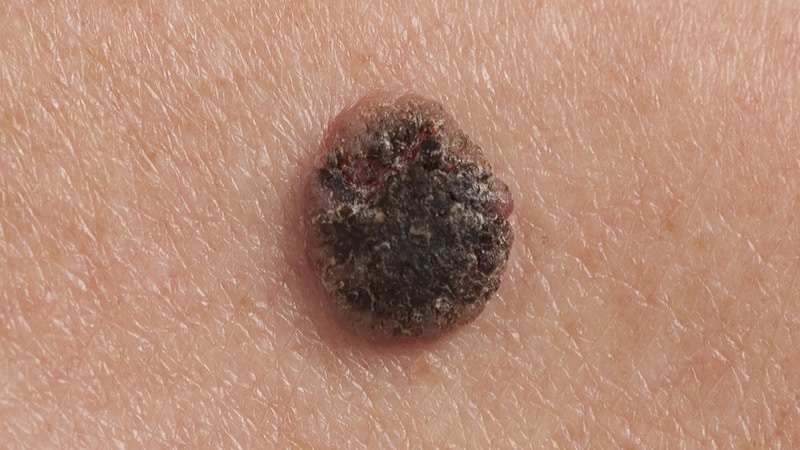Genetic Profiling Reveals High-Risk Cutaneous SCC Tumors
Core Concepts
Identification of gene expression patterns in T2a cSCC tumors can help predict poor outcomes and guide treatment decisions.
Abstract
The study focused on identifying gene expression patterns in T2a cutaneous squamous cell carcinoma (cSCC) tumors associated with poor outcomes. Researchers found 12 upregulated genes and four downregulated genes in tumors with poor outcomes. The findings aim to improve risk assessment and prognosis for cSCC patients, potentially leading to personalized treatment strategies. The study utilized NanoString technology to assess gene expression and link patterns to clinical outcomes. The research sheds light on the importance of gene expression profiling in identifying therapeutic targets and stratifying high-risk tumors.
Key Highlights:
Identification of gene expression patterns in T2a cSCC tumors
Upregulation of 12 genes and downregulation of four genes in poor outcome tumors
Potential implications for personalized treatment strategies
Utilization of NanoString technology for gene expression assessment
Importance of gene expression profiling in identifying therapeutic targets
Genetic Profiling Identifies High-Risk Cutaneous SCC Tumors
Stats
"12 genes were significantly upregulated in tumors with poor outcomes."
"Four novel genes were downregulated in patients with poor outcomes."
"A total of 27 T2a tumors were assessed in 27 patients."
Quotes
"Understanding gene expression profiling may help provide identification of novel therapeutic targets." - Jaclyn R. Himeles, MD
"Gene expression profiling may be able to assist in determining which patients are more likely to have a poor outcome." - Anthony J. Olszanski, RPh, MD
Key Insights Distilled From
by Roxanne Nels... at www.medscape.com 05-18-2023
https://www.medscape.com/viewarticle/992130
Deeper Inquiries
How can gene expression profiling impact the development of targeted therapies for cSCC?
Gene expression profiling plays a crucial role in identifying specific genes that are upregulated or downregulated in cutaneous squamous cell carcinoma (cSCC) tumors associated with poor outcomes. By understanding these gene expression patterns, researchers can potentially develop targeted therapies that focus on these specific genes. This personalized approach to treatment can lead to more effective and tailored therapies for patients with cSCC. Additionally, the identification of novel therapeutic targets through gene expression profiling can pave the way for the development of new drugs or treatment strategies that specifically target the genes involved in the progression of cSCC.
What are the potential drawbacks or limitations of relying on gene expression patterns for treatment decisions?
While gene expression profiling holds great promise in personalized medicine and targeted therapies, there are several potential drawbacks and limitations to consider. One limitation is the complexity of interpreting gene expression data and translating it into actionable treatment decisions. The field of genomics is still evolving, and there may be challenges in accurately interpreting the significance of certain gene expression patterns in the context of cSCC.
Another limitation is the need for validation and clinical evidence to support the use of gene expression profiling in treatment decisions. Without robust validation studies, there is a risk of over-reliance on genomic testing, which could lead to unnecessary anxiety for patients and increased healthcare costs. Additionally, the heterogeneity of cSCC tumors and the dynamic nature of gene expression patterns over time may pose challenges in using gene expression profiling as a sole basis for treatment decisions.
How might advancements in gene expression analysis influence the future of cancer prognosis and treatment?
Advancements in gene expression analysis have the potential to revolutionize the future of cancer prognosis and treatment. By identifying specific gene expression patterns associated with poor outcomes in cSCC, researchers can improve risk assessment, prognosis, and treatment strategies for patients. Gene expression profiling can help stratify patients based on their molecular profiles, allowing for more personalized and targeted therapies that address the unique genetic characteristics of each patient's tumor.
Furthermore, advancements in gene expression analysis may lead to the discovery of novel therapeutic targets and biomarkers that can guide treatment decisions and monitor treatment response. This precision medicine approach holds the promise of improving patient outcomes, reducing unnecessary treatments, and minimizing adverse effects. As gene expression analysis technologies continue to evolve, they are likely to play an increasingly important role in shaping the future of cancer prognosis and treatment, ultimately leading to more effective and personalized care for patients with cSCC.
0
More on Medical Research
